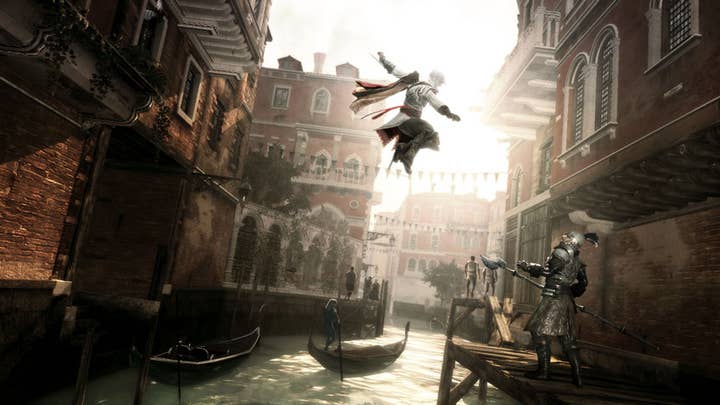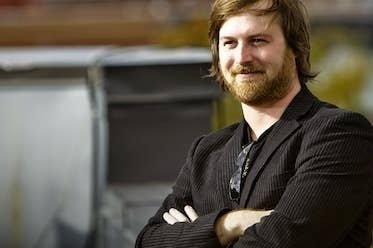Patrice Desilets: "We can be pioneers"
As the Assassins Creed creator nears 40, he reflects on his games, the state of the business and the evolution of interactivity
The first time I see Patrice Desilets, he's surrounded by attendees of Barcelona's Gamelab conference: a long line of students and budding developers clutching copies of Assassin's Creed and Prince of Persia. Desilets shakes their hands, smiles for their pictures, signs their games, and nervously looks at his watch as the remaining minutes before his hour-long talk melt away. This sort of unabashed adulation happens at game conferences, but not often. It seems that the creator of Assassin's Creed has joined the ranks of the superstars.
But Desilets is also in a period of transition. His decision to leave Ubisoft for THQ Montreal didn't work out as planned, and his return to Ubisoft resulted in his dismissal and the possible loss of an ambitious new project: 1666: Amsterdam. The details of what happened between Desilets and Ubisoft are unclear, and with legal proceedings already under way he is unable to offer much more than a simple message: he is unwilling to let two years of work sit on the shelf, and he will fight to make sure that doesn't happen.
In the meantime, Desilets has plenty of time to reflect: on his past work, on the state of the industry, and on the crossroads he has reached as he approaches his 40th birthday.
Patrice: So I saw your story yesterday.
"I'm part of the problem. I did the same games for 15 years. So it's my fault, but we're all getting a bit older, and it's time to try something else"
I was having a wink at that. But, honestly, I never actually put a date on the future. I didn't say, 'in two years it's all going to be digital, or in five years.' I just think, 'come on, guys, the future is going to be digital.' And maybe right now we don't fully understand it, so we don't know how to communicate what digital is and how it will actually work. But I was a bit like, 'Really?' It's all going to be digital, and we're already halfway through it. That's why I took the CD as an example. I know some people still buy CDs and vinyl, but nobody's yelling at Apple because of iTunes. I just find that a bit hypocritical. Just a little bit. Because Microsoft was trying to do something [different], and yes the message wasn't the best one, and it wasn't delivered the best way, but in the end I think people will buy most games on PSN on PlayStation 4 and Xbox Live on Xbox One.
The problem is the message, and how to deliver the message. They focused on the wrong stuff. They didn't have to mention that you needed an internet connection every 24 hours. They didn't have to do that.
And a lot of those people - the hardcore gamers - will buy both consoles in the end anyway.
Aren't we there already?
"I can't be the only one seeing all of these music and game stores closing. What's the reason? People aren't going to them anymore"
Some people still want the objects, and Microsoft will give that to them. But you and I, and more and more people all the time, won't buy the object. I can't be the only one seeing all of these music and game stores closing. What's the reason? People aren't going to them anymore.
The best thing about all of this is that we're having these discussions. We're all thinking collectively about the future of the industry. That's the most interesting part. Whatever it will be, we're talking about it. I like that.
Because we're there. I said in my presentation that I'm part of the problem. I did the same games for 15 years. I did games about a character that jumps around with a sword. So it's my fault, but we're all getting a bit older, and it's time to try something else. The reason we're now thinking about it is that, technologically, we see we can do something more.
In the way you interact with the game world, it's much easier to destroy than create. When you get into more subtle subject matter, which is about human interactions, it's tough.

That's exactly it. It's a good analogy. I tried a little bit with Assassin's Creed. I catered to gamers because it's an assassin game and you kill a lot of people, but the way you play in the crowd and the environment - it's about the texture. Games are machines built on binary, so things are either there or they're not there. Killing is the easiest thing to do.
"There aren't many game developers who retire. We can be pioneers"
With Assassin's Creed I really wanted to make the player walk, and to have the pleasure of exploration and looking around. You know, climbing a tower and seeing the whole city, that gives a strong emotion. Me, I like this. I love walking around in a new city and observing. That's me. Some people get that, and some people don't - that's not their pleasure.
The killing part was important, but I feel - and I don't want to say anything bad about what they [Ubisoft] are doing with the franchise - but I feel that it has flipped a little bit. It's less and less about the enjoyment of your surroundings and observation and more and more about the combat and killing.
That's hard to answer, because in my work over the last two years I was going elsewhere. And now I don't have it, so I can't talk about it. It's really tough. It's funny, because I said in my talk that when I turned 30 I asked myself if I should continue making games, and Assassin's Creed came out of that period of reflection. I'm about to turn 40 now, and I'm at another crossroads. But the decision I made 10 years ago to continue, that's still valid today.
People have asked me if I might do a movie now, but no. I make games. I like the dialogue [with the player]. I like giving you the tools to find your own pleasure, and being the co-creator of the experience.
Yes, exactly. There aren't many game developers who retire. We can be pioneers.
No. Look at what Telltale did with The Walking Dead. There are two Walking Dead games, and the better one is the slower-paced adventure game. It's an amazing game, and there will be more and more. David Cage is trying this stuff also - maybe trying a little bit too much to be like a movie than a game, but... It's funny, I've never met David. I think maybe some time Mr. Cage and I should sit down and have a chat. So that's an official invitation [laughs].
There are so many devices for playing games today, and there's no problem with action games, or the free-to-play business model and the games we're making with that. They're great. There's a good variety of games. But the games I like to make and play are adventure games with a slower pace. They are interactive experiences, and the business for those games these days is only so-so.
"I have ideas for smaller games, so maybe I'll open a little indie shop and do one of those"
But it's still a post-apocalyptic game. It's like Fallout in that way. How come there's nothing like Hamlet, where it's about people and talking? The thing that human beings do the most is talk and communicate, so where is the fun in doing that in a game? That's where we're stuck these days. We need to find where the pleasure is in that.
I used to do a lot of theatre, and improv acting is tough, but in a game? Woah, it's much tougher. It's a shame, because I was working on something pretty cool in Montreal before they took it away from me.
If I don't win? I don't think about that, because what's the point? It would be a shame, but that's it. I'm just trying to stay positive that it will happen, and that everybody will get to play it one day - myself included, by the way. Meanwhile, I have many other game ideas in my little book, and I'll dig into that.
It would be difficult to do 1666 as an independent studio of 12 people. Let's be honest here. But the indie scene and all the small studios are really attractive to me these days: to be in control, and to have fun, and to not have to deal with all the politics of a huge corporation. So I'm in-between because, yes, in general I have big ideas, and I have been so lucky to get to make them. But I have ideas for smaller games, like I say, so maybe I'll open a little indie shop and do one of those. That's okay.
I said yesterday that AAA won't disappear, but I should have said that maybe the AAA of 60-hours with everything on a disc will kind of disappear. Even with 1666, I was contemplating whether we do that or maybe go episodic - like The Walking Dead. So I'm giving you maybe five hours of it, and if there's a market it will continue, and if not we can stop. That way, you don't need $100 million. You can do it for $15 million and see if there's a public for it out there. You need to design all 60 hours, but then you focus on making the first 5, and then the next, and then the next. That's another reason I like digital, by the way. It makes that so much easier to do. And then, like The Walking Dead, when everything is done you can buy your disc with everything on there.
"The thing that human beings do the most is talk and communicate, so where is the fun in doing that in a game?"
Yeah. And you can play around with cliffhangers, and you can break down the repetitiveness that's a part of all video games. So the AAA of 60 hours may disappear, but the quality will still be there. I'd like to ask a question, because I don't have the answer: what is AAA? What does that mean now?
That's what I was getting at yesterday. The blockbuster part will not disappear, even if the way we sell it to the gamer will change. People will always want that, and I believe that eventually I will make those five-hour, amazing interactive experiences that talk about more subjects than we can now. Hey, maybe I'll do Hamlet.
[laughs] Yeah, 'Desilets: Maybe I'll do Hamlet.'

